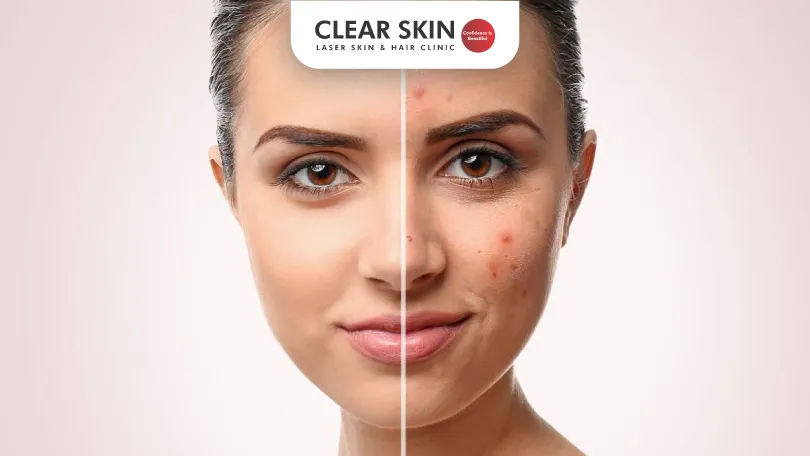Effective Treatment of Acne on Face
Reviewed By: Dr Dhananjay chavan
Updated on: 25th November, 2024

Acne is a common skin concern that affects many individuals, causing frustration and a desire for clear, blemish-free skin. Finding the appropriate treatment for acne on the face can majorly impact your skin’s appearance and your general confidence.
In this article, we will look at different treatment alternatives to assist you in getting smoother skin and reclaiming your confidence
Table Of Content
- Understanding Acne: Causes and Types
- Over-the-Counter Solutions for Acne
- Prescription Treatments: When to Consider Them?
- Dermatological Procedures for Acne Removal
- Incorporating Natural Remedies
- Preventive Measures to Maintain Clear Skin
- Conclusion
Understanding Acne: Causes and Types
To treat acne effectively, you first need to know what causes it and the different types.
Causes of acne:
- Hormonal Imbalances: Changes in hormones can trigger acne, especially during puberty, pregnancy, or menstrual cycles.
- Excess Oil Production: Overactive oil glands can clog pores, leading to breakouts.
- Blocked Pores: When oil gland openings get blocked, it can result in acne.
- Bacterial Growth: Certain bacteria on the skin can worsen acne by causing inflammation.
Types of Acne:
- Whiteheads – Closed, clogged pores that appear as small white bumps.
- Blackheads – Open, clogged pores that look dark due to oxidation.
- Papules – Small, red, inflamed bumps.
- Pustules – Pimples filled with pus (often red with white centres).
- Cysts – Large, painful bumps that are deep under the skin.
Understanding these causes and types can help you choose the right treatment method for your skin!
Over-the-Counter Solutions for Acne
Over-the-counter (OTC) acne treatments are commonly utilized when looking for acne treatment for the face. OTC medicines frequently contain chemicals such as benzoyl peroxide, salicylic acid, and clindamycin which aid in unclogging pores, the reduction of inflammation, and eliminating microorganisms.
Including these products in your daily skincare routine can help prevent and manage acne, but use of the same without guidance may lead to dryness, acne flare-ups, and other side effects.
Prescription Treatments: When to Consider Them?
A dermatologist may be required for more stubborn or severe cases of acne. They can make prescription recommendations based on your specific needs. Topical therapies such as retinoids, antibiotics, and combination medications are available on prescription. These therapies tackle the underlying causes of acne and provide more effective outcomes than over-the-counter solutions.
Dermatological Procedures for Acne Removal
Dermatological procedures can give helpful answers when acne is severe and leaves scars or chronic blemishes. Chemical peels treatment, microdermabrasion, and laser therapy for acne and pigmentation, comedone extraction, intralesional injections, intense pulse light, cryotherapy can help enhance the skin’s texture, minimize scarring, and stimulate general skin rejuvenation and are decided depending on type and severity of acne.
Professionals execute these treatments, which can result in substantial improvements in the appearance of acne-prone skin.
Incorporating Natural Remedies
Many people prefer natural acne treatments for their faces. Anti-inflammatory and antibacterial qualities of ingredients such as tea tree oil, witch hazel, and aloe vera can soothe the skin and lessen acne symptoms.
While natural therapies are softer on the skin, it is critical to visit a dermatologist before using them to confirm they are appropriate for your skin type and severity of acne.
Preventive Measures to Maintain Clear Skin
Preventing future breakouts is just as important as treating current ones. Stick to a simple skincare routine with gentle cleansing, exfoliation, and moisturising to keep your skin clear and healthy.
Avoid touching your face, use non-comedogenic makeup, and maintain a balanced diet to help reduce the chances of acne coming back.
Do You Know?
Roughly 250 Patients Are Treated
Everyday By These Dermatologists
(You are one click away from flawless skin)
Meet Our Dermatologist!
Conclusion
Acne on the face can be challenging to cure, but you can get clearer and healthier skin with the appropriate approach. Consider contacting Clear Skin Clinic Pune for expert advice and practical solutions suited to your individual skin needs.
Their unique approach to acne treatment combines years of experience with the most recent advances in dermatology. Remember that consistency and patience are essential, as is consulting a professional.
Further Reading
Is Tretinoin Cream Safe for Melasma? Tips and Usage Guide
Discover how tretinoin cream can safely treat melasma.
Unveiling the Potential of Face Packs for Acne Scars
Discover how homemade and customized face packs can help lighten acne marks and rejuvenate your skin.
Home Remedies for Acne Scars
Effective Home Remedies for Acne Scars
Salicylic Acid: Your Ultimate Guide to Banishing Acne Scars
Salicylic acid helps fade acne scars by exfoliating the skin and promoting cell renewal. Discover its benefits, effectiveness, and how to use it safely.
Have thoughts? Please let us know
We are committed not only to treating you, but also educating you.






